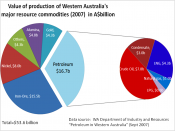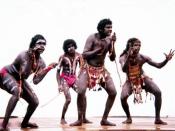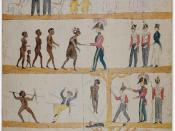Today, most White Australians are sensitive and distinctively aware of the social and cultural issues related to Aborigines. This must be credited to playwrights such as Jack Davis and Wesley Enoch&Deborah Mailman as they reveal the brutal discrimination, abuse to Australia's Indigenous people and their sacred culture through their pieces No Sugar and 7 Stages of Grieving. Both plays utilise the theatrical techniques of Western theatre in conjunction with their tradition way of story telling to convey themes of struggle, prejudice and the destruction of Aboriginal culture. First wave playwright, Jack Davis writes the lives of the Millimurra family in their struggle to survive the Depression early in the 20th century No Sugar, while 7 Stages of Grieving focuses on the lives of the modern generation of Australian Aboriginal. This time gap will reflect the changing cultural, social and political issues in Australia.
No Sugar was written in a period when the majority of Australians were completely unaware of their situation and became influential along with other texts such as My Place by Sally Moran, which also discloses the reality of Aboriginal people.
No Sugar is the second play in a trilogy called " The First Born", which traces the history of the Aborigines in Western Australia from the first White settlement, or in their perspective, invasion, in 1928 to the lives of urban Aboriginals today. The first play Kulluck (Home) shows the destruction of the Nyoongah people as a community and the social and economic oppression they suffered with the arrival of Europeans. Davis wrote this play in 1979 as an angry response to the celebration of Western Australia's 150th anniversary of White 'settlement'. No Sugar was written just two years before the national celebration of the Bicentenary and depicts the lives of post-tribal or pre-urbanised Aborigines people who...


